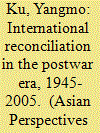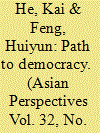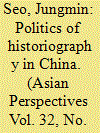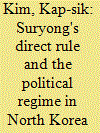|
|
|
Sort Order |
|
|
|
Items / Page
|
|
|
|
|
|
|
| Srl | Item |
| 1 |
ID:
085292


|
|
|
|
|
| Publication |
2008.
|
| Summary/Abstract |
Under what conditions do sets of two former adversary states with deeply rooted historical animosity try to reconcile with each other? When they seek bilateral reconciliation, why are the outcomes significantly different? France and Germany were historic antagonists that fought three catastrophic wars between 1870 and 1945. In the postwar era, however, their antagonism and hostility dramatically evolved into mutual partnership and cooperation. Unlike the Franco-German case, Japan-Republic of Korea relations still remain frigid due to mistrust and enmity, although sixty-three years have passed since Korea's liberation from Japanese colonial rule. This article argues that in both cases, the motives for reconciliation were mainly derived from realpolitik concerns such as security and economy. Structural conditions also affected the initiation of international reconciliation. Nonetheless, it was the dynamics of political leaders and nongovernmental organizations that played central roles in differentiating the reconciliation processes and outcomes in the two dyadic relationships.
|
|
|
|
|
|
|
|
|
|
|
|
|
|
|
|
| 2 |
ID:
085302


|
|
|
|
|
| Publication |
2008.
|
| Summary/Abstract |
Olsonian theory supposes that when labor unions are organized in an encompassing manner at the industrial and national levels, they can better prevent collective action problems and bring about more stable industrial relations. This theory regards the encompassing labor organization as a positive institution. However, the Korean case shows weak theoretical and empirical relevance for the proposition, as institutionalized talks between government, business, and labor did not contribute to establishing stability in industrial relations. In some respects, the situation only worsened. The Korean case therefore suggests that the optimistic propositions of encompassing organizations of labor require a careful reassessment.
|
|
|
|
|
|
|
|
|
|
|
|
|
|
|
|
| 3 |
ID:
085303


|
|
|
|
|
| Publication |
2008.
|
| Summary/Abstract |
China's transition is drawing worldwide attention. China started market economic reforms in 1978 and is rapidly closing its economic gap with the developed world. The Chinese public and Chinese leaders have started to debate and explore where China should go politically and how to get there. After examining the merits and weaknesses of four prevailing theories of democratization-modernization, social mobilization, cultural/social capital, and negotiation-pact transition theory-we conclude with an appropriate model for China's political future. We argue that (1) the conflict between the reform and conservative groups inside the communist regime will shape the process of China's democratization; (2) the hope of China's political future lies in continued economic development, a mature civil society, and the building of democratic political culture in society; and (3) the current intra-party democracy promoted by Hu and Wen signals a positive trend for China's future democratization.
|
|
|
|
|
|
|
|
|
|
|
|
|
|
|
|
| 4 |
ID:
085293


|
|
|
|
|
| Publication |
2008.
|
| Summary/Abstract |
This article contextualizes the emergence of the Chinese claim over the historical ownership of Koguryo in the politics of historiography in China. Contemporary Chinese historiography from which the Chinese state and populace draw core identities has never been fully fixed or stabilized. Regardless of the temporal distance from the present, Chinese pasts are continuously constructed and re-memorized based on contemporary sociopolitical needs. Compared to the pre-reform eras, broadened social spaces in China have made the Chinese Communist Party's monopoly over historiography untenable. In that sense, the future of East Asian regional order or Sino-Korean relations is highly unpredictable, if not unstable, due to the continuously changing Chinese national identity. With radical nationalization of China's imperial past, the next generation in China may favor actions to alter the status quo. National and state identities informed by "historical facts" are hardly negotiable or changeable.
|
|
|
|
|
|
|
|
|
|
|
|
|
|
|
|
| 5 |
ID:
085297


|
|
|
|
|
| Publication |
2008.
|
| Summary/Abstract |
The political system in North Korea has been characterized as a "Suryong Dominant Party-State System." Since the mid-1980s, however, its political system has displayed two interesting aspects. Formally, the broad "Suryong System" has been maintained; in practice, however, the Workers' Party of Korea, the Korean People's Army, and the government have come to acquire respectively different and considerably strengthened roles. Under this new regime, Kim Jong Il Suryong directly rules over the party, the government, and the military. Meanwhile, the political-ideological base, the military base, and the economic base are administered respectively by the party, the army, and the government. Interestingly, while the power of the party still overwhelms that of the military and the government, the party's means of influence has changed from giving direct orders to providing provisions or encouraging policy outlines
|
|
|
|
|
|
|
|
|
|
|
|
|
|
|
|
|
|
|
|
|